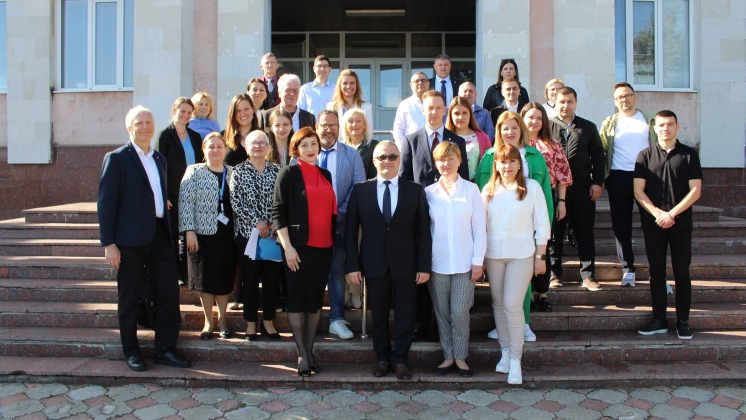
The international project - "Enhancing the capacity of universities to initiate and participate in the development of clusters on the principles of innovation and sustainable development" (UniClaD), brings together six partners from the European Union and four from the Republic of Moldova, Ukraine and Azerbaijan. The partners from the Republic of Moldova are: Comrat State University (CSU), Technical University of Moldova (UTM), SRL Fabrica "Oloi Pak" and SRL "Terafix". The participants of the Workshop on April 8-10, 2024 were welcomed by the Rector of CSU Assoc/ prof., PhD Serghei Zaharia. The Rector emphasized the significant impact of the project on the development of agro-industrial clusters and the potential of Comrat State University in training specialists and providing consulting services, as well as in the innovative aspects of the project in the direction of the agrarian and industrial sectors. Project Coordinator Vitaute Hydraitine noted that the UniClaD project provides more opportunities for cooperation in the field of sustainable development of clusters. The presentation of the Expert Center "Agrobiotechnologies" CSU was presented, where Assoc. Prof., PhD Ludmila Fedotova acquainted the participants with the mission of the Center, its work, partners of the Center, its importance and the list of services provided by the Expert Center. CSU plays an important role in the UniClaD consortium by organizing consultations, developing courses for students, developing the Expert Center, disseminating the results of the project, as well as participating in the mobility of teachers and students. The following topics were presented at the Workshop:
- Application of IT-technologies in agriculture (presentation - 20 min., questions and answers - 10 min., summarizing - 10 - 15 min., practical part - 45 min.), Giedrius Geciavicius, KK HEI (Lithuania);
-Cluster Innovation Farm in Austria (presentation - 20 min., Q&A - 5 min., summarizing - 10 min.), Georg Wiesinger, Klaus Wagner, BAB (Austria);
- Best practices in the creation of training courses (presentation - 20 min., Q&A - 10 min., summarizing - 10 - 15 min., practical part - 45 min.), Veronika Hager, Stephanie Mayrhofer, Georg Wiesinger, HAUP and BAB (Austria);
-Agricultural Knowledge and Innovation System (AKIS), (presentation - 20 min., Q&A - 10 min., summarizing - 15 min., practical part (Analysis of AKIS infrastructure + Living Lab - 30 min.), Noureddine Driuesch, Ciheam Bari (Italy);
-Lean Management in Agriculture (presentation - 20 min., Q&A - 10 min., summarizing - 10 - 15 min., practical part - 45 min.), István Komlósi, UD (Hungary);
-Clusters in the agri-food sector, (presentation - 20 min, Q&A - 10 min, summarizing - 10 - 15 min, practical part - 45 min), Leticia Chico-Santamarta, UVA (Spain);
-Example of good practices related to cluster activities in Azerbaijan (presentation - 20 min., Q&A - 10 min., summarizing - 10 min.) Kushvar Mammadova, AGSAU (Azerbaijan);
-The role of clusters in improving the competitiveness of agricultural producers in the agri-food supply chain (presentation - 15 min., Q&A - 5 min., summarizing - 10 min.), Izabela Lipinska, PULS (Poland);
-Modern cluster movement in Ukraine. Example of synergy of UniClaD consortium members (presentation - 30 min., Q&A - 5 min., summarizing - 10 min.), Natalia Maevska, Food Valley (Ukraine);
- Current situation with clustering in the agricultural sector of Azerbaijan (presentation - 15 min., Q&A - 5 min., summarizing - 10 min.), Anar Jafarov, Agrarian Innovation Center (Azerbaijan).
During the Workshop, the project participants visited the milk processing enterprise "SANA", cattle breeding farm "DOKSANCOM" in Tomai village, museum in Avdarma village, familiarized themselves with the history and traditions of the Gagauz people. CSU, according to the experts of the project, has a significant impact on the development of the agro-industrial sector of the ATU Gagauzia region, being the vanguard of the innovative processes of the branch. International project "Increasing the capacity of universities to initiate and participate in the development of clusters on the principles of innovation and sustainability" (UniClaD).
The Erasmus+ program, KA2 project No. 609944-EPP-1-2019-1-LT-EPPKA2-CBHE-funded by the European Union and coordinated by the Lithuanian University of Applied Sciences-aims to use the potential of universities in stimulating agro-industrial clusters by creating innovation centers focused on the success of these clusters
Information was provided by the project coordinator from Comrat State University
Assoc. prof., PhD Ludmila Fedotova



